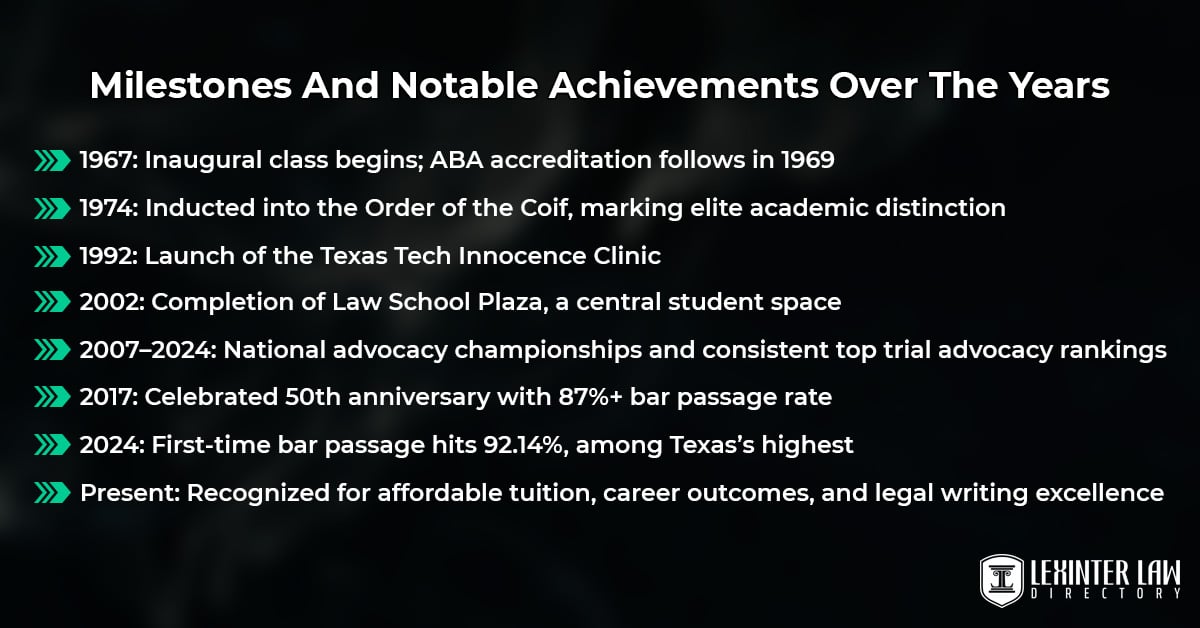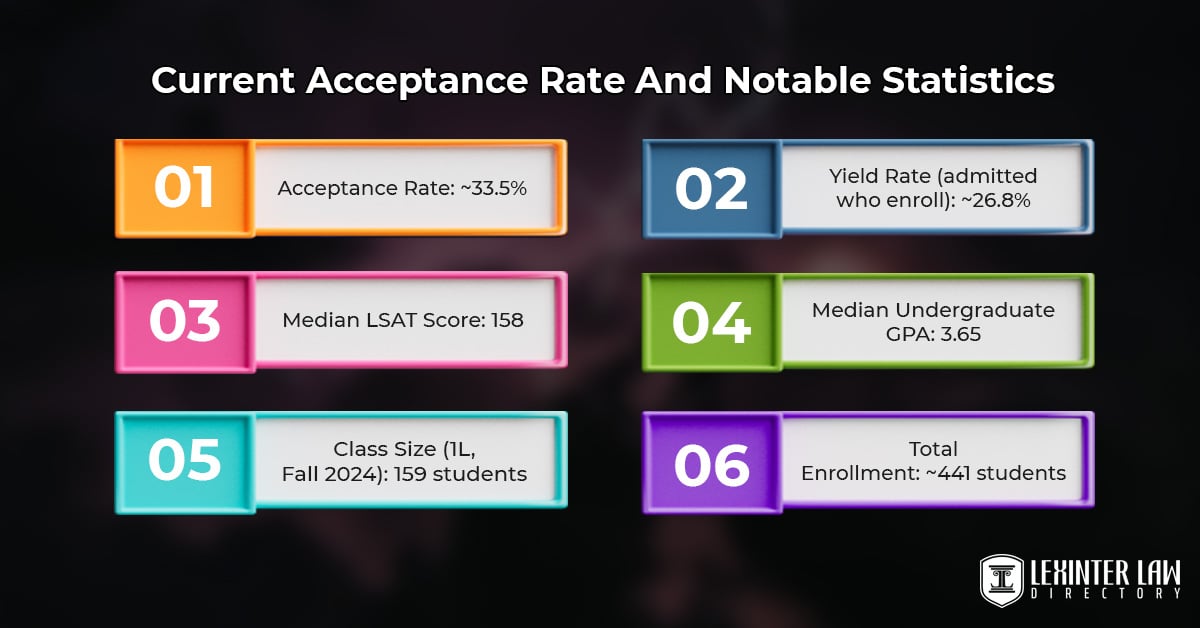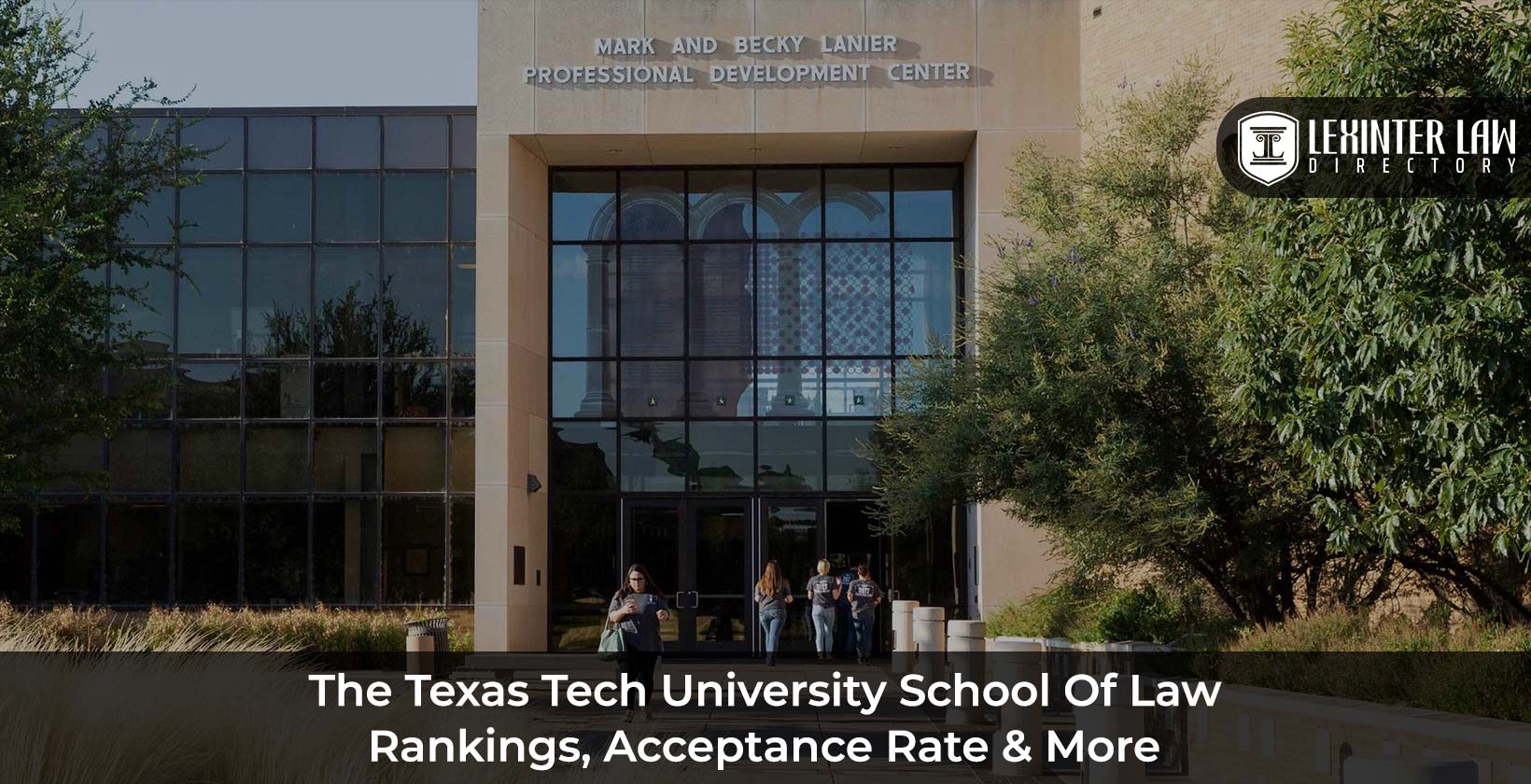The Texas Tech University School Of Law: Rankings, Acceptance Rate & More
Tucked into the high plains of Lubbock, Texas Tech University School of Law has evolved from a regional newcomer to a national contender in legal education. Since opening its doors in 1967, it has built a reputation for exceptional advocacy programs, outstanding bar passage rates, and a practical, student-centered approach to learning the law.
But Texas Tech Law is more than just rankings and credentials—it’s a dynamic community where future legal leaders are forged. With a focus on real-world experience and accessibility, it provides students with the tools to thrive in a rapidly evolving legal landscape.
Table of Contents
Location And Address
Texas Tech University School of Law
Address: 3311 18th Street, Lubbock, Texas 79409‑0004
Phone: (806) 742‑3791 • Fax: (806) 742‑1629 • Email: [email protected]
The law school is situated on the southwest corner of Texas Tech’s 1,839-acre main campus in Lubbock, a vibrant city located on the Llano Estacado. As of 2024, Lubbock is the 10th‑largest city in Texas, home to around 272,000 residents, offering a lively, growing community that enriches both academic and personal life for students.
Historical Background
Founded in 1967, Texas Tech University School of Law began with a vision to provide affordable, high-quality legal education in West Texas. It has since grown into a nationally respected institution rooted in practical excellence.
The Start Of Texas Tech University School Of Law
In the fall of 1967, Texas Tech Law welcomed its first class of 72 students. With a small faculty and modest resources, the school quickly earned accreditation and established a strong academic foundation. From the outset, its mission was clear: to equip future lawyers with the tools to serve, lead, and advocate effectively.
Milestones And Notable Achievements Over The Years

Texas Tech University School of Law has a rich history of milestones and notable achievements, solidifying its position as a premier institution of legal education. Here is a condensed and updated list of major milestones:
- 1967: Inaugural class begins; ABA accreditation follows in 1969
- 1974: Inducted into the Order of the Coif, marking elite academic distinction
- 1992: Launch of the Texas Tech Innocence Clinic
- 2002: Completion of Law School Plaza, a central student space
- 2007–2024: National advocacy championships and consistent top trial advocacy rankings
- 2017: Celebrated 50th anniversary with 87%+ bar passage rate
- 2024: First-time bar passage hits 92.14%, among Texas’s highest
- Present: Recognized for affordable tuition, career outcomes, and legal writing excellence
Academic Excellence
Texas Tech Law is known for blending rigorous legal education with hands-on experience. Its nationally ranked advocacy teams, accessible faculty, and career-focused curriculum position graduates for real-world success across diverse areas of legal practice.
Overview Of The Programs And Specializations
Texas Tech offers a comprehensive Juris Doctor (JD) program with options to concentrate in areas like business law, criminal law, and environmental law. Advanced degrees include the Master of Laws (LLM) and the Doctor of Juridical Science (SJD).
Dual-degree opportunities combine law with fields such as business, public administration, or social work. Students gain real-world training through robust clinical programs, externships, and advocacy competitions, making Tech Law a leader in experiential legal education across Texas and beyond.
Faculty Qualifications And Achievements
Texas Tech Law’s faculty includes nationally recognized scholars, former judges, and seasoned practitioners. Many hold advanced degrees from top-tier institutions and contribute regularly to influential legal publications.
Professors are deeply engaged in mentoring, known for combining scholarship with practical insights. Faculty members have argued before the U.S. Supreme Court, advised legislative bodies, and led legal reform efforts in Texas. Their open-door approach fosters close student-faculty collaboration, enhancing the school’s strong reputation for accessible, high-quality legal instruction.
Rankings And Reputation
Texas Tech Law is renowned for career-ready graduates and academic strength. U.S. News ranks it within the top half of national law schools, with standout specialty rankings that reflect its growing reputation for quality education.
Current Rankings Of Texas Tech University School Of Law
The Texas Tech University School of Law consistently ranks among the top law schools in the nation. The law school is currently ranked:
- #88 in the 2025 U.S. News & World Report “Best Law Schools” rankings
- #34 in Trial Advocacy
- #44 in Legal Writing
- #59 in Dispute Resolution
- Ranked among the Top 10 “Best Value Law Schools” by National Jurist
- Recognized for strong bar passage, employment outcomes, and affordable tuition
These rankings underscore Texas Tech Law’s continued commitment to academic excellence, practical legal training, and accessible, high-impact legal education.
Factors Contributing To The Law School’s Reputation And Recognition
Tech Law’s reputation is built on its national advocacy awards, high bar pass rate (~92%), specialized rankings, and affordable tuition. Its community-centered clinics and strong employment outcomes further enhance its image. Combined with a practical curriculum and a supportive, accessible faculty, it solidifies the school’s strong standing among mid-tier to upper-tier U.S. law schools.
Rigorous Curriculum
Texas Tech Law offers a well-rounded curriculum that combines doctrinal classes, skills workshops, and practical experiences. From its foundational courses in constitutional and criminal law to upper-level specialties and litigation training, the curriculum is rooted in experiential learning. Through clinics, externships, and advocacy teams, students earn practical credentials before graduation.
Distinguished Faculty
The faculty includes former judges, U.S. Supreme Court advocates, published scholars, and national legal award winners, such as Professor Gerry Beyer, in the field of trusts and estates. Recognized for both research and teaching, they offer mentorship, host scholarly events, and bridge theory with practice, enriching student experience with accessible expertise and real-world insight.
High Bar Passage Rates
Texas Tech Law achieved a 92.14% first-time bar passage rate in 2024, well above the Texas average (~79%). Its weighted ABA bar pass data confirms consistent two-year performance of around 95.9%. Such results significantly bolster graduates’ career prospects and elevate the school’s reputation.
Successful Alumni
The school’s alumni network includes high-profile figures like Judge Barbara Lynn (JD ’76) and Justice Eva Guzman (JD ’82), alongside leaders in private practice, government, and NGOs. Their achievements in judicial, legislative, and executive roles enhance Tech Law’s legacy and offer mentorship and employment avenues for current students and alumni.
Affordable Tuition
One of the law school’s standout features is its affordability. Texas Tech Law offers one of the most cost-effective tuition rates among Texas’s top-tier law schools.
Texas Tech offers one of the most cost-effective law educations in Texas: the 2024–25 tuition is $27,532 for in-state students and $38,932 for out-of-state students, with ~85% of students receiving grants, averaging $10,000 each. High financial aid access and low debt burden support diversity and accessibility while strengthening institutional value.
Admissions
Texas Tech Law offers a highly selective, applicant-focused admissions process. It seeks students with strong academics, clear legal motivation, and diverse backgrounds, balancing LSAT/GPA benchmarks with personal experiences and leadership potential.
An In-Depth Look At The Admissions Process
Applicants submit LSAT scores, undergraduate transcripts, letters of recommendation, a personal statement, and a resume. Admissions decisions are holistic, emphasizing academic ability, legal interest, character, and leadership.
- Median LSAT: 158 (range: 154–160)
- Median GPA: 3.65 (range: 3.40–3.82)
- Required materials: LSAT, transcripts, two recommendation letters, personal statement, resume
Current Acceptance Rate And Notable Statistics

Texas Tech University School of Law remains moderately selective, attracting high-achieving applicants across Texas and beyond. The acceptance rate has increased slightly, reflecting broader interest from applicants and consistent academic standards.
- Acceptance Rate: ~33.5%
- Yield Rate (admitted who enroll): ~26.8%
- Median LSAT Score: 158 (25th–75th percentile: 154–160)
- Median Undergraduate GPA: 3.65 (25th–75th percentile: 3.40–3.82)
- Class Size (1L, Fall 2024): 159 students
- Total Enrollment (JD): ~441 students
These figures underscore the school’s commitment to assembling a talented and diverse class while maintaining academic excellence and accessibility.
Noteworthy Alumni And Their Contributions
Texas Tech University School of Law has a distinguished alumni network of over 10,000 graduates who have made significant contributions to the legal profession and society as a whole. Texas Tech Law’s alumni hold prominent roles in law, government, and academia.
- Robert L. Duncan (JD ’81): Former Texas Tech System Chancellor and long-serving Texas state legislator.
- Major General Walter B. Huffman (JD ’67): Former U.S. Army Judge Advocate General and longtime faculty dean.
- Judge James Wesley Hendrix (JD ’?): U.S. District Judge for the Northern District of Texas, based in Lubbock.
These leaders exemplify the impactful roles graduates play in public service, military law, the judiciary, and higher education.
Campus Facilities
Situated on Texas Tech’s main Lubbock campus, the modern law building houses a library with over 400,000 volumes, a full-scale courtroom, a moot court room, technology-equipped classrooms, quiet study spaces, and a student lounge designed for collaboration and relaxation.
Notable Features
The picturesque Law School Plaza features seating, green spaces, and a fountain, creating a welcoming environment for gatherings. The law library provides access to cutting-edge digital and print resources. A lifelike courtroom and dedicated moot court space allow real-world practice. Student-friendly breakout rooms, the lounge, and group study areas support both focused work and social interaction, fostering a balance between productivity and social engagement.
Technology And Resources For Students
Texas Tech Law provides laptop loans, printing/scanning services, and access to Westlaw, LexisNexis, HeinOnline, and Texas Tech Law Review. The IT team offers technical support and training sessions. Smart classrooms equipped with projectors and wireless connectivity support hybrid learning. Students also benefit from workshops on legal technology, citation tools, and document drafting software.
Student Life
Texas Tech Law offers a vibrant student community supported by a dedicated Office of Student Life. With around 30+ student organizations, a focus on academic wellness, and an inviting campus culture, students thrive inside and outside the classroom.
Extracurricular Activities, Student Organizations, And Clubs
Students can join diverse groups, including the Student Bar Association (SBA), advocacy teams, Family Law Society, and media outlets like KTXT‑FM and The Daily Toreador. The SBA serves as the student government, supporting wellness and inclusivity initiatives. Beyond law, students engage with university-wide clubs, academic support programs, and community events, enriching their legal education with collaboration, leadership, and peer-driven activities.
Community Engagement And Pro Bono Opportunities
Texas Tech Law requires J.D. students to complete 30 hours of public service—including at least 15 pro bono hours—before graduation. Students join the Pro Bono Honor Roll, assisting through Wills Clinics, DACA aid, tax assistance (VITA), and legal service organizations like Legal Aid of NorthWest Texas. The Community Engagement Committee and local initiatives provide ongoing, hands-on support to underserved communities across Texas.
Career Opportunities
Texas Tech Law produces highly skilled, practice-ready graduates sought after by law firms, government agencies, public interest organizations, and corporations. Comprehensive career services, strong employer connections, and robust professional development support students into successful, meaningful legal careers.
Jobs After Graduation
Graduates enjoy strong employment outcomes: 96.95% of the Class of 2024 secured full-time, long-term positions within ten months of graduation (127 out of 131). Roles span private firms (70%), government (12%), business/industry (9%), public interest (3%), and clerkships. Private-sector starters earn a median of $82,400, while public-sector entrants average around $76,700.
Working With Law Firms And Others
Texas Tech Law School works with many law firms, government agencies, and groups. This helps students learn more and find jobs.
- Law Firms: Big law firms in Texas like to work with students from Texas Tech Law. Many students get jobs or learn at these firms.
- Government Agencies: The school has connections with various government agencies. They offer job opportunities and provide opportunities to learn about working for the government.
- Groups: The school also helps students work with groups that give free legal help to people. Students can volunteer and learn a lot.
Texas Tech Law School makes sure students have many chances to do well in their law careers. They learn, meet helpful people, and can make a big difference.
Frequently Asked Questions About The Texas Tech University School Of Law
1. What Is The LSAT Score For Texas Tech Law School?
The median LSAT score for Texas Tech University School of Law is 158, and the 25th-75th percentile range is 154-160. Half of the admitted students scored between 154 and 160 on the LSAT, indicating a competitive admission process and a focus on academic excellence in law studies.
2. What Is Texas Tech Law School Ranked In Texas?
Texas Tech University School of Law currently ranks 6th among Texas law schools, according to 2025 assessments by Juris Education and U.S. News peer comparisons. This positions it just behind UT‑Austin, Texas A&M, SMU, St. Mary’s, and the University of Houston, reflecting its continued strong standing statewide.
Conclusion
Texas Tech University School of Law isn’t just where legal careers begin—it’s where leaders are made. With a legacy of academic excellence, unmatched advocacy success, and a deep commitment to public service, it equips students to make a real impact.
From the courtroom to the community, Tech Law graduates are driving change. Affordable, accessible, and ambitious, this is more than a law school—it’s a launchpad for justice, leadership, and lifelong success. The future of law starts right here in Lubbock.

